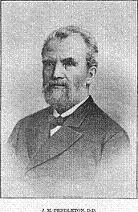
James Madison Pendleton, D. D.
The Baptist Encyclopedia, 1881

James Madison Pendleton, D.D., was born Nov. 20, 1811, in Spottsylvania Co., Va. His parents, John and Frances J. Pendleton, removed to Christian Co., Ky., when he was one year old, and
[p. 898]
settled upon a farm near the present village of Pembroke. Upon this farm he lived until he was twenty years old. During the winter seasons he attended the best schools the community afforded, and with the judicious training of his excellent parents he was better educated than the average farmer boy.At fifteen he became interested in the subject of religion, but his convictions did not result in conversion until he was seventeen, when he united with the Bethel church, near Pembroke. He was baptized by Rev. John S. Wilson, April 14, 1829.
In February, 1831, he was licensed to preach, and began the work of the ministry before he was twenty years of age.
He is the only licentiate ever sent forth by the Bethel church to this date (1878). Unum sed Leonem. In 1833 he entered the Christian County Seminary at Hopkinsville, and took a three years' course of instruction in the Latin and Greek classics, meantime preaching for the Hopkinsville and Bethel churches alternate Sundays. At the former church he was ordained Nov. 1, 1833. In 1837 he accepted the call of the church in Bowling Green, Ky., and entered upon a pastorate of twenty years. Soon after this settlement he formed the acquaintance of Miss Catharine Stockton Garnett, of Glasgow, Ky., who became his wife in 1838. By her piety and abounding good works she has proved herself to be a model pastor's wife. They have four children living, three of whom are wives of professional gentlemen, and the other, a son, is a lawyer in the city of Philadelphia.
During his twenty years' pastorate at Bowling Green, in 1849, Dr. Pendleton cordially espoused Henry Clay's gradual emancipation measures, and supported them by many newspaper publications. The vote of the State, however, was largely against those measures, and slavery remained unchanged till the "civil war" wrought its overthrow.
In 1857, Dr. Pendleton was elected Professor of Theology in Union University, Murfreesborough, Tenn. He had ever esteemed the pastorate his office and preaching his function in life, and would accept the professorship only with the proviso that he should have a pastorate also. Arrangements were made at once that he should become pastor of the Baptist church in Murfreesborough, and he removed to his new field, where he remained until the civil war laid its paralyzing hand upon church and college. The unquenchable loyalty of the man made it necessary for him to remove to the Northern States. After a short settlement of three years, from 1862 to 1865, at Hamilton, O., he removed, in November, 1865, to Upland, Pa., where he has ever since been the highly esteemed and faithful pastor.
At an early day, Dr. Pendleton became an almost constant writer for the denominational press and for the local papers of his community. Of this kind of literature few men except editors are so prolific. Besides, he has published many books, pamphlets, tracts, and sermons, such as "Three Reasons why I am a Baptist," "Church Manual," "Treatise on the Atonement," "Sermons on Important Subjects," "Christian Doctrines, a Compendium of Theology," the last of which is generally conceded to be a masterly. production, concise, logical, orthodox, and comprehensive, and supplying a long felt want in the curriculum of theological education and in the libraries of Christian households.
Dr. Pendleton is a hard student, devoting his morning hours to his study, which he keeps well stocked with only the best and most approved evangelical literature, and history, biography, and philosophy. His impatience with irreverence and looseness guards his library from the intrusion of liberalism and trash.
He preaches as he writes, after a well-defined model or plan, from which he seldom swerves even in the most impassioned efforts. He is methodical in his work, and resolutely follows his prearranged plans, alternating study with pastoral visitation with a regularity few men can maintain. He is devout, serious, conscientious, and yet highly appreciates good wit and humor, and is ready and judicious in the use of them. He is of medium height, well proportioned, firm of step as of convictions, a sincere friend, generous to every good cause according to his ability, unostentatious and affable with his friends, reserved among strangers. and cautious of his associations. His integrity of character and honesty of conviction are absolutely above suspicion, and are due to his abiding, unshaken trust in God.
================== [From William Cathcart, editor, The Baptist Encyclopedia, 1881; reprint. 1988, pp. 897-898. Scanned and formatted by Jim Duvall.]
More on J. M. Pendleton
Baptist History Homepage